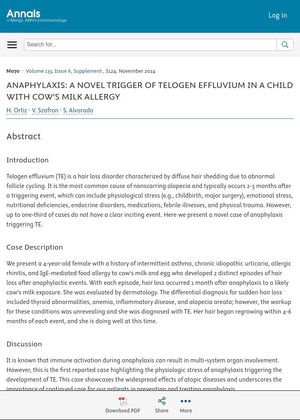Anaphylaxis: A Novel Trigger of Telogen Effluvium in a Child with Cow's Milk Allergy
October 2024
in “
Annals of Allergy Asthma & Immunology
”

TLDR Anaphylaxis from cow's milk allergy can cause temporary hair loss in children.
This document presents a novel case of telogen effluvium (TE) triggered by anaphylaxis in a 4-year-old girl with a cow's milk allergy. TE, a common cause of nonscarring alopecia, typically follows a triggering event, but this is the first reported instance of anaphylaxis causing TE. The child experienced two episodes of hair loss, each occurring one month after an anaphylactic reaction to cow's milk. Other potential causes of hair loss were ruled out, and her hair regrew within 4-6 months after each episode. This case highlights the significant impact of atopic diseases and the importance of managing anaphylaxis to prevent such stress-induced conditions.



